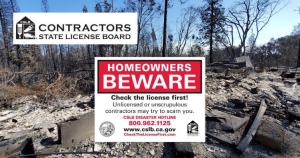The California Contractors State License Board (CSLB) has long warned against the dangers of “renting” a qualifier—where a licensed individual allows their name and license to be used by a construction company without actually overseeing its operations. This practice has not only led to a rise in consumer complaints but has also drawn increased scrutiny from regulators.
With recent amendments to the law, California has strengthened its enforcement tools, redefining what it means to supervise a contracting business, imposing new restrictions on subcontracting, and extending the statute of limitations for licensing violations. Contractors and construction business owners must be aware of these changes, as failure to comply can result in severe penalties, including license revocation, fines, and even criminal charges.
The Risks of “Renting” a Qualifier
A Responsible Managing Officer (RMO) or Responsible Managing Employee (RME) must exercise direct supervision and control over the contracting operations of the business they qualify for. Under California law, if an RMO or RME merely lends their name to a company without being actively involved in its construction activities, they and the company face serious legal consequences.
Under Business and Professions Code § 7068.1, the definition of “supervision and control” now includes:
- Direct supervision or control, which can mean:
- Supervising construction operations.
- Managing construction activities by making technical and administrative decisions.
- Checking jobs for proper workmanship.
- Supervision on construction sites.
This means an RMO or RME cannot simply be a name on paper. They must be involved in the day-to-day operations of the business, ensuring that all work is performed according to the code and professional standards. If they fail to do so, CSLB has the power to take disciplinary action, which can include license suspension or revocation under Section 7068.1 and criminal penalties under Business and Professions Code § 7122.5 and Penal Code § 802.
To combat license renting, the CSLB has formed a task force dedicated to investigating rented qualifiers. The task force scrutinizes exam waiver requests, investigates whether a qualifier has a true ownership stake in the business, has an active role in the company’s activities, and revokes improperly obtained licenses or rented licenses.
New Restrictions on Subcontracting Since 2024
Many contractors are unaware that California has implemented stricter rules governing how specialty contractors can hire subcontractors in addition to cracking down on rented qualifiers.
Under Business and Professions Code § 7035, effective January 1, 2024, a specialty contractor may not subcontract work within their same license classification on a single project unless:
- The subcontractor employs persons who are classified as employees to perform work in that license classification on the single project or undertaking (employees must be classified workers as employees rather than independent contractors); OR
- The specialty contractor is a signatory to a bona fide collective bargaining agreement that governs subcontracting practices.
A contractor or subcontractor violating these new rules may face disciplinary action from CSLB. The legislative intent behind the change in the law is to prevent the misclassification of workers and ensure compliance with labor laws.
For contractors who frequently subcontract work within their classification, this change could have a significant impact. It is critical for every general and subcontractor to evaluate their current subcontracting practices and ensure they align with these new requirements.
Extended Statute of Limitations for Licensing Violations
In 2024, the California legislature amended Penal Code § 802(d)(3) , extending the time prosecutors have to file charges against contractors, subcontractors, and individuals violating California’s contractor licensing laws. Previously, authorities had only one year to pursue criminal cases related to the misuse of a contractor’s license (e.g., renting a qualifier). Now, authorities have up to three years after the commission of the offense to initiate their prosecution.
This means that contractors who lend their licenses to unqualified businesses—or knowingly allow illegal use of their license—are at risk of prosecution for a much longer period.
What This Means for Contractors and Subcontractors
With these new regulations in place, contractors should take immediate steps to ensure compliance with the amended California’s contractor licensing laws:
- For RMOs/RMEs: If you are listed as the qualifier for a business, make sure you are directly supervising its construction activities. CSLB is actively investigating inactive qualifiers, and failure to meet the legal definition of “supervision and control” can lead to license revocation and/or criminal charges.
- For Construction Business Owners: If your license is based on an RMO or RME who is not directly involved in operations, you are at risk. Review your structure to ensure compliance before CSLB investigates or intervenes.
- For Specialty Contractors: Review your subcontracting practices. If you routinely hire subcontractors within your own classification, verify whether you classify your workers as employees, or if you are covered under a collective bargaining agreement.
- For All Contractors: Be aware that CSLB and state prosecutors now have three years to investigate and file charges for certain licensing violations. What may have previously gone unnoticed for over a year can now result in delayed but serious legal consequences.
The days of using a “paper qualifier” or loosely subcontracting within the same classification without oversight are coming to an end. With tougher enforcement, expanded legal definitions, and longer prosecution timelines, the CSLB and state regulators are making it clear that they intend to hold contractors accountable for these violations.
Contractors should take a proactive approach by reviewing their licensing status, subcontracting relationships, and compliance practices. Those who fail to do so risk disciplinary action, loss of their license, financial penalties, or even worse – criminal prosecution.



